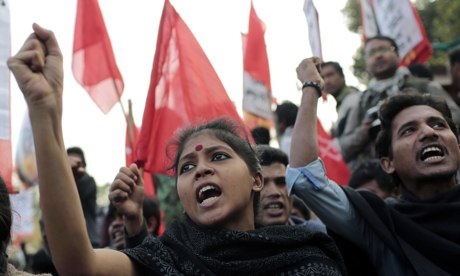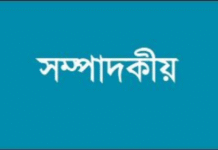With 21 people dead, along with further human rights abuses and an absence of opposition, serious questions must now be asked of this government
My cousin Amna (not her real name), a student at Anwer Khan Modern Medical College in Dhaka, is currently resitting her crucial exams and missed all her classes in the past two weeks because of the recent instability in Bangladesh. “My friends are afraid and nobody wants to come into college,” she told me. It was not safe for her to travel back to the capital, with violent clashes between protesters and police on the streets, strikes and road blockades, and buses being petrol-bombed. “Bangladesh is very dangerous at the moment. People didn’t want to go out during election time. There is horror every day.”
I think about when I visited Bangladesh, navigating the dusty alleyways with Amna, hailing a rickshaw and picking up hot parathas and halwa en route to Dhanmondi lake to watch the sun rise. It was Victory day in Bangladesh. But now there is nothing to celebrate after the most recent elections. The country is still being choked by a toxic political culture in which winner takes all, and where there is no room for reconciliation with the opposing side. Sheikh Hasina was sworn in as prime minister this weekend, with the backdrop of putting the opposition leader, Khaleda Zia, under house arrest and banning 21 political parties. The absence of opposition parties raises concerns about the credibility of the elections.
The Hasina regime’s record of human rights abuses and the level of corruption is serious, and it is disconcerting that pro-government newspapers and elite commentators overlook this. Moreover, their support for the Shahbag movement, whose demands include hanging those accused at the domestic war crimes tribunal, banning opposition political parties and arresting editors who are critical of them, is deeply disturbing. Although the Bangladeshi novelist Tahmima Anam argued in the Guardian that Bangladesh doesn’t have to go back to being a basket case, the only way to prevent this is to have a real democracy, stop the political point-scoring, stop seeking revenge, and focus on unity and working towards a more pluralist society.
This was the most violent election day in Bangladesh’s history, with 21 people killed as they headed to the polls, and in the run-up to the elections there have been night raids on the homes of opposition supporters. Yet human rights abuses by the regime’s security forces are nothing new. Last year, the offices of human rights activists were ransacked for reporting on abuses by the government’s security forces against protesters, while activists Adilur Rahman Khan and Naseeruddin Elan of the Bangladeshi human rights group Odhikar were arrested and are now appearing before a cyber crimes tribunal. There have also been violent attacks on journalists, including the murder of a blogger. And it is the same government security forces that charged with batons and opened fire on protesters who were demanding compensation for the loss of their loved ones after the Rana Plaza factory tragedy, in which more than 1,100 people died.
Much of the current instability is happening because Hasina slashed open some old wounds of the nation: the prime minister had made a manifesto pledge to hold accused “war criminals and collaborators [of Pakistan]” on trial – despite a previous general amnesty in 1973 which had been granted by Hasina’s father, Sheik Mujibur Rahman. It was an election winner for Hasina’s Awami League party against the Bangladeshi National party (BNP), who had been successful in elections in 2001 when they made a partnership with Jamaat-e-Islami. In 2010, Hasina’s government set up the “international” war crimes tribunal and most of those on trial are long-standing members of Jamaat-e-Islami. Last month, Abdul Quader Mollah was the first defendant to be hanged. This war crimes tribunal has been condemned as unjust by the international community, including the UN and Amnesty. It has been marred by scandals including the abduction of defence witnesses by police from the court, to the exposure of partiality and collusion between judges, prosecution and the state.
Are these shackles of war and political grudges what we want the next generation of Bangladeshis to inherit? Grave crimes were committed and have to be addressed. There has to be restorative justice for the victims of the war, and as I have argued elsewhere, there can be truth and reconciliation even after 40 years. But has justice been done with unfair trials, division and more spilt blood? Serious questions must be asked of the government; and with steps taken to eliminate the opposition, is Hasina’s regime taking an even more authoritarian direction? There are suggestions that there was less than 10% voter turnout in the elections. The EU, US and Commonwealth nations did not send observers to monitor the polls, which were not deemed to be “transparent, inclusive and credible”. While allies have not previously said much of consequence on the country’s human rights record, and usually heap platitudes on Bangladesh’s progress, the real test will be how they interact with this government in the future, and whether they will legitimise the corruption that they have just called out.
Source: UNBConnect











Hasina does not care about Bangladesh. India does not care about Bangladesh. Even Bangladeshis do not care about Bangladesh. If they did, they should have come out. Gonojagoron Mancha has been having a fun time singing Awami League and Communist party agenda. Where were you Bangladeshis. Hiding. Is that what you do best. Do you care about Bangladesh? Then you must eradicate these 2 ladies. They are vermin and very destructive. They do not love Bangladesh. They just want their families to rule Bangladesh. If that is what you want, then no one can protect you. I guess you love this sadistic attitude of the ruling party. You are a bunch of no-gooders. You deserve another 5 years of Sheikh Hasina, the plunderer of our nation.